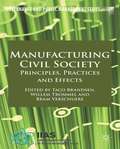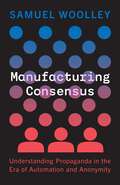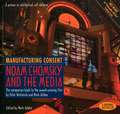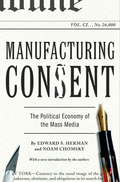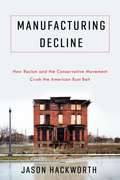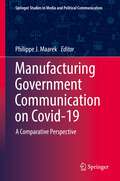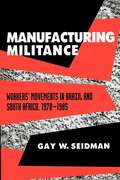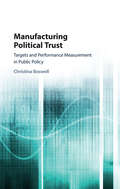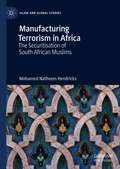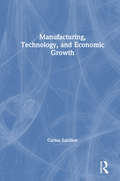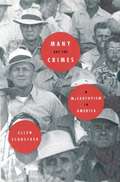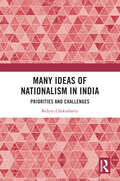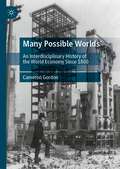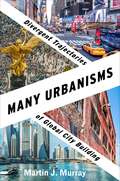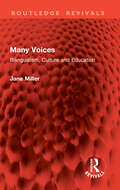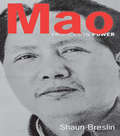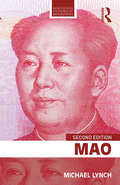- Table View
- List View
Manufacturing Citizenship: Education and Nationalism in Europe, South Asia and China (Routledge Research in Education)
by Véronique BénéïIn recent years citizenship has emerged as a very important topic in the sciences, mainly as a result of the effects of migration, population displacements and cultural heterogeneity. This book focuses on educational enterprise and how it affects national ambitions, cultural preferences and political trends. It also examines the major effects of globalisation, the large-scale movements of populations, and the impact this all has in terms of education and citizenship. With contributions from an array of international scholars including Etienne Balibar, and featuring various international case studies, Manufacturing Citizenship will be extremely interesting to the education academic community as well as many readers within cultural studies and politics.
Manufacturing Civil Society
by Taco Brandsen Willem Trommel Bram VerschuereFaced with falling social cohesion governments have sought to revitalise society by trying to reconstruct local communities, civil society and citizenship. As a result, civil society is increasingly brought within the realm of public management, subject to accountability and embedded in hierarchies the impact and origins of which this book explores
Manufacturing Consensus: Understanding Propaganda in the Era of Automation and Anonymity
by Samuel WoolleyAn in-depth exploration of social media and emergent technology that details the inner workings of modern propaganda Until recently, propaganda was a top-down, elite-only system of communication control used largely by state actors. Samuel Woolley argues that social media has democratized today’s propaganda, allowing nearly anyone to launch a fairly sophisticated, computationally enhanced influence campaign. Woolley shows how social media, with its anonymity and capacity for automation, allows a wide variety of groups to build the illusion of popularity through computational tools (such as bots) and human-driven efforts (such as sockpuppets—real people assuming false identities online—and partisan influencers). They use these technologies and strategies to create a bandwagon effect by bringing the content into parallel discussions with other legitimate users, or to mold discontent for political purposes. Drawing on eight years of original international ethnographic research among the people who build, combat, and experience these propaganda campaigns, Woolley presents an extensive view of the evolution of computational propaganda, offers a glimpse into the future, and suggests pragmatic responses for policy makers, academics, technologists, and others.
Manufacturing Consent
by Mark AchbarManufacturing Consent Noam Chomsky and the Media, the companion book to the award-winning film, charts the life of America's most famous dissident, from his boyhood days running his uncle's newsstand in Manhattan to his current role as outspoken social critic.A complete transcript of the film is complemented by key excerpts from the writings, interviews and correspondence. Also included are exchanges between Chomsky and his critics, historical and biographical material, filmmakers' notes, a resource guide, more than 270 stills from the film and 18 "Philosopher All-Stars" Trading Cards!Mark Achbar has applied a wide range of creative abilities and technical skills to over 50 films, videos, and books. He has worked as editor, researcher and production coordinator."A juicily subversive biographical/philosophical documentary bristling and buzzing with ideas."--Washington Post"You will see the whole sweep of the most challenging critic in modern political thought."--Boston Globe"One of our real geniuses, an excellent introduction."--Village Voice"An intellectually challenging crash course in the man's cooly contentious analysis, laying out his thoughts in a package that is clever and accessible."--Los Angeles TimesContents:The Man. Early Influences. Vietnam A Turning Point. On His Role. The Media. Thought Control in Democratic Societies. A Propaganda Model. The Gulf "War". A Case Study Cambodia & East Timor. Concision A Structural Constraint. "Sports Rap with Noam Chomsky." A Cabal of Anti-Conspiricists. Media in Media, Pennsylvania. Alternative Media. The Linguist. Basic Premises. Nim Chimsky: Chimpanzee. And the Elusive Connection to his Politics. The Social Order. On Education. Anarchism/Libertarian Socialism. Resistance & Critical Analysis. The Critics (Media-Based). William F. Buckley, Jr. "Firing Line". David Frum Journalist, Washington Post. Jeff Greenfield Producer, "Nightline". Karl E. Meyer Editorial Writer, The New York Times. Peter Worthington Editor, The Ottawa Sun. The Critics (Other Elites). Fritz Bolkestein Former Dutch Minister of Defense. Michel Foucault Philosopher. Yossi Olmert Tel Aviv University. John Silber
Manufacturing Consent: The Political Economy of the Mass Media
by Noam Chomsky Edward S. HermanAn intellectual dissection of the modern media to show how an underlying economics of publishing warps the news.
Manufacturing Decline: How Racism and the Conservative Movement Crush the American Rust Belt
by Jason HackworthFor decades, the distressed cities of the Rust Belt have been symbols of deindustrialization and postindustrial decay, their troubles cast as the inevitable outcome of economic change. The debate about why the fortunes of cities such as Detroit have fallen looms large over questions of social policy. In Manufacturing Decline, Jason Hackworth offers a powerful critique of the role of Rust Belt cities in American political discourse, arguing that antigovernment conservatives capitalized on—and perpetuated—these cities’ misfortunes by stoking racial resentment.Hackworth traces how the conservative movement has used the imagery and ideas of urban decline since the 1970s to advance their cause. Through a comparative study of shrinking Rust Belt cities, he argues that the rhetoric of the troubled “inner city” has served as a proxy for other social conflicts around race and class. In particular, conservatives have used images of urban decay to craft “dog-whistle” messages to racially resentful whites, garnering votes for the Republican Party and helping justify limits on local autonomy in distressed cities. The othering of predominantly black industrial cities has served as the basis for disinvestment and deprivation that exacerbated the flight of people and capital. Decline, Hackworth contends, was manufactured both literally and rhetorically in an effort to advance austerity and punitive policies. Weaving together analyses of urban policy, movement conservatism, and market fundamentalism, Manufacturing Decline highlights the central role of racial reaction in creating the problems American cities still face.
Manufacturing Government Communication on Covid-19: A Comparative Perspective (Springer Studies in Media and Political Communication)
by Philippe J. MaarekThis book presents a comparative perspective on different government communication strategies to COVID-19 around the globe. Scholars from twenty parts of the world specialized in political and government communication analyze initiatives and methods of various governments' communicative responses to the pandemic. In their contributions to this volume, they examine a wide range of distinct attitudes and reactions facing the crisis. Today’s omnidirectional contact allowed by social media, with its load of contradictory rumors and fake news, often obliterates the citizens' ability to comprehend reality. The book frames a broad canvas on how government communication may deal with that and manage similar crises — bound to happen as climate changes and war menaces are generating more and more worries about the future of humanity. This makes this volume a must-read for scholars and students of political communication, health policies and communication, crisis marketing and communication. It will also be of utmost interest for practitioners and policy-makers from these fields willing to better understand government communication and its answer to global crises.
Manufacturing Hysteria: A History of Scapegoating, Surveillance, and Secrecy in Modern America
by Jay FeldmanA vital, engaging, and sometimes troubling story of modern America's struggle to live up to its ideals. In this ambitious and wide-ranging history, Jay Feldman takes us from the run-up to World War I and its anti-German hysteria through the September 11 attacks and Arizona's current anti-immigration movement. What we see is a striking pattern of elected officials and private citizens alike using the American people's fears and prejudices to isolate minorities (ethnic, racial, political, religious, or sexual), silence dissent, and stem the growth of civil rights and liberties. Whether it's the post-World War I persecution of radicals; the Depression-era deportations of Mexican immigrants and Mexican-Americans; the World War II internment of 112,000 ethnic Japanese along with thousands of German and Italian aliens; the Cold War campaigns against Communists, gays, and civil-rights activists; or the Vietnam-era COINTELPRO operations, we see how economic, military, and political crises have been used to curtail the rights of supposedly subversive minorities. Much of the story can be laid at the feet of J. Edgar Hoover, but Feldman goes deeper to show how these tendencies have been part of a continuous vein that runs through American life. Rather than treating this history as a series of discrete moments, Feldman considers the entire programmatic sweep on a scale no one has yet approached. In doing so, he gives us a potent reminder of how, even in America, democracy and civil liberties are never guaranteed.From the Hardcover edition.
Manufacturing Mennonites
by Janis Lee ThiessenManufacturing Mennonites examines the efforts of Mennonite intellectuals and business leaders to redefine the group's ethno-religious identity in response to changing economic and social conditions after 1945. As the industrial workplace was one of the most significant venues in which competing identity claims were contested during this period, Janis Thiessen explores how Mennonite workers responded to such redefinitions and how they affected class relations.Through unprecedented access to extensive private company records, Thiessen provides an innovative comparison of three businesses founded, owned, and originally staffed by Mennonites: the printing firm Friesens Corporation, the window manufacturer Loewen, and the furniture manufacturer Palliser. Complemented with interviews with workers, managers, and business owners, Manufacturing Mennonites pioneers two important new trajectories for scholarship - how religion can affect business history, and how class relations have influenced religious history.
Manufacturing Militance: Workers' Movements in Brazil and South Africa, 1970-1985
by Gay W. SeidmanChallenging prevailing theories of development and labor, Gay Seidman's controversial study explores how highly politicized labor movements could arise simultaneously in Brazil and South Africa, two starkly different societies. Beginning with the 1960s, Seidman shows how both authoritarian states promoted specific rapid-industrialization strategies, in the process reshaping the working class and altering relationships between business and the state. When economic growth slowed in the 1970s, workers in these countries challenged social and political repression; by the mid-1980s, they had become major voices in the transition from authoritarian rule.Based in factories and working-class communities, these movements enjoyed broad support as they fought for improved social services, land reform, expanding electoral participation, and racial integration.In Brazil, Seidman takes us from the shopfloor, where disenfranchized workers organized for better wages and working conditions, to the strikes and protests that spread to local communities. Similar demands for radical change emerged in South Africa, where community groups in black townships joined organized labor in a challenge to minority rule that linked class consciousness to racial oppression. Seidman details the complex dynamics of these militant movements and develops a broad analysis of how newly industrializing countries shape the opportunities for labor to express demands. Her work will be welcomed by those interested in labor studies, social theory, and the politics of newly industrializing regions.
Manufacturing Militarism: U.S. Government Propaganda in the War on Terror
by Christopher J. Coyne Abigail R. HallThe U.S. government's prime enemy in the War on Terror is not a shadowy mastermind dispatching suicide bombers. It is the informed American citizen. With Manufacturing Militarism, Christopher J. Coyne and Abigail R. Hall detail how military propaganda has targeted Americans since 9/11. From the darkened cinema to the football field to the airport screening line, the U.S. government has purposefully inflated the actual threat of terrorism and the necessity of a proactive military response. This biased, incomplete, and misleading information contributes to a broader culture of fear and militarism that, far from keeping Americans safe, ultimately threatens the foundations of a free society. Applying a political economic approach to the incentives created by a democratic system with a massive national security state, Coyne and Hall delve into case studies from the War on Terror to show how propaganda operates in a democracy. As they vigilantly watch their carry-ons scanned at the airport despite nonexistent threats, or absorb glowing representations of the military from films, Americans are subject to propaganda that, Coyne and Hall argue, erodes government by citizen consent.
Manufacturing Political Trust: Targets and Performance Management in Public Policy
by Christina BoswellMeasurement and targets have been widely criticised as distorting policy and engendering gaming - yet they continue to be widely used in government. This book offers an original new account explaining the persistent appeal of performance measurement. It argues that targets have been adopted to address a crisis of trust in politics, through creating more robust mechanisms of accountability and monitoring. The book shows that such tools rarely have their intended effect. Through an in-depth analysis of UK targets on immigration and asylum since 2000, it shows that far from shoring up trust, targets have engendered cynicism and distrust in government. Moreover, they have encouraged intrusive forms of monitoring and reform in public administration, with damaging consequences for trust between politicians and civil servants. Despite these problems, performance measurement has now become embedded in techniques of public management. It has also become normalised as a way of framing policy problems and responses. Thus despite their acknowledged problems, targets are likely to retain their allure as techniques of political communication and governance. Employs a range of theoretical approaches from across the social and political sciences to examine the use of performance targets in public policy; Focuses on the highly topical subject of political trust, and how governments attempt to address voter mistrust in politicians and political institutions; Analyses the highly relevant subject of contemporary UK immigration and asylum to illustrate the pitfalls of using performance measurement targets.
Manufacturing Terrorism in Africa: The Securitisation of South African Muslims (Islam and Global Studies)
by Mohamed Natheem HendricksThis book uses Securitisation Theory to explore how Muslims have been constructed as a security issue in Africa after the 9/11 attacks in the United States. These attacks became the rationale for the US’s Global War on Terror (GWOT). The centrality of Africa as an arena to execute the GWOT is the focus of this book. This book explores, particularly, how western-centred security discourses around Muslims has permeated South African security discourse in the post-apartheid period. It claims that the popular press and the local think-tank community were critical knowledge-sites that imported rather than interrogated debates which have underpinned policy-initiatives such as the GWOT.Such theorisation seems contrary to the original architects of securitisation theory who maintain that issues become security concerns when institutional voices declare these as such. However, this book confirms that non-institutional voices have securitised the African Muslims by equating them with terrorism. This book illustrates that such securitisation reproduces partisan knowledge that promote Western interests.
Manufacturing, Technology, and Economic Growth
by Carlos SabillonThis book analyzes the development of economic events in Japan, China, the NICs, Russia, Germany, Britain, and the United States of America during the second half of the twentieth century in an effort to uncover the variables that were determinant for the generation of economic growth. After analyzing numerous economic and non-economic variables, the author manages to identify a common denominator that was always present when there was growth and absent when there was stagnation. A strong causality linkage is established between this common denominator and growth. The book also demonstrates how this common set of variables can be easily manipulated by government policy in order to deliver fast and sustained economic growth. The book concludes with a clear set of macroeconomic policies for the attainment of fast, non-inflationary growth in developing countries, middle-income nations, transition economies, and developed countries.Despite its unorthodox position, the book endorses free trade, privatization, liberalization, fiscal rectitude, low inflation, central bank independence, proper governance, protection of the environment, and better income distribution. With this approach, the book offers a fresh new look on the problem of growth and offers hope that economic science will finally provide governments with an effective policy tool for the elimination of poverty and unemployment.
Many Are the Crimes
by Ellen SchreckerIt all seems like so much ancient history -- the "red scare", black lists; even Senator Mccarthy. Yet, in truth, the so-called "Mccarthy period" -- during which people were persecuted and investigated for what they thought -- is one of the most shameful periods of our history. In her book, ellen Schrecker takes a hard look at this phenomenon and draws some sobering conclusions. If you love freedom and liberty and feel that all of us need to work to keep it safe -- from the right and the left -- this book is a must read. And, lest you think this is ancient history, think about some of the hysterical sexual abuse trials of the eighties and nineties. From whence will the next danger come?
Many Children Left Behind
by Deborah MeierSigned into law in 2002, the federal No Child Left Behind Act (NCLB) promised to revolutionize American public education. Originally supported by a bipartisan coalition, it purports to improve public schools by enforcing a system of standards and accountability through high-stakes testing. Many people supported it originally, despite doubts, because of its promise especially to improve the way schools serve poor children. By making federal funding contingent on accepting a system of tests and sanctions, it is radically affecting the life of schools around the country.But, argue the authors of this citizen's guide to the most important political issue in education, far from improving public schools and increasing the ability of the system to serve poor and minority children, the law is doing exactly the opposite. Here some of our most prominent, respected voices in education-including school innovator Deborah Meier, education activist Alfie Kohn, and founder of the Coalition of Essential Schools Theodore R. Sizer-come together to show us how, point by point, NCLB undermines the things it claims to improve:* How NCLB punishes rather than helps poor and minority kids and their schools * How NCLB helps further an agenda of privatization and an attack on public schools * How the focus on testing and test preparation dumbs down classrooms * And they put forward a richly articulated vision of alternatives. Educators and parents around the country are feeling the harshly counterproductive effects of NCLB. This book is an essential guide to understanding what's wrong and where we should go from here. From the Trade Paperback edition.
Many Children Left Behind: How the No Child Left Behind Act Is Damaging Our Children and Our Schools
by Deborah Meier George WoodThe No Child Left Behind (NCLB) Act is counterproductive and destructive to the goal of improving public education in the United States, collectively argue the contributors of these six essays. They describe how the "test and punish" regime of the NCLB, because disabilities are strongly correlated with poverty, will further damage the ability of schools in poor communities to provide for their students as they fall behind in testing scores and are punished for it financially. They also explore how the NCLB can be considered a Trojan horse for school privatization and put forth an alternative agenda for school reform.
Many Ideas of Nationalism in India: Priorities and Challenges
by Bidyut ChakrabartyThis book is a comprehensive analysis of the many visions of nationalism and nationalist leadership that emerged during India’s struggle for independence. The volume examines key nationalist thinkers such as Aurobindo, Gandhi, Tagore, Nazrul, Savarkar, and Ambedkar. It delineates different strands of nationalism in the post-moderate phase of nationalist movement and discusses political emancipation, social emancipation, and ethnic emancipation.Accessibly written for students with a helpful overview of how nationalist thought emerged in India, this book will be of great interest to students of South Asian history and politics. It will also be helpful for civil service aspirants.
Many Possible Worlds: An Interdisciplinary History of the World Economy Since 1800
by Cameron GordonThis book provides a crosscutting interdisciplinary account of how the disintegrated, global subsistence economy circa 1800 has transformed into a global complex delivering unprecedented levels of material production and consumption. Applying major findings from economics, history/historiography, and sociology (as well as from anthropology, psychology, politics, and environmental studies), the analysis tracks the ways in which changes in ‘society’ (including social structures, values, and forces) have changed ‘individuals’ (including conceptions of race, gender, and identity) and vice versa. These changes have simultaneously homogenised and diversified societies and individuals in distinct but sometimes contradictory ways, opening up many possible worlds from an individual and group perspective. Yet, the scale and pace of change has also led to increasing existential challenges. The narrative consists of 30 chapters organized into 10 subsets of 3: one chapter on a relevant core idea; one chapter focused on historical narrative and titled after a representative year; and one chapter on a relevant associated crosscutting theme. Major regional and topical discussions are provided, with special attention paid to business and organisational change and developing world scholarship. Small discussion ‘boxes’ focusing on illustrative cases and details are presented throughout the book. The last chapter contains over-arching conclusions.
Many Urbanisms: Divergent Trajectories of Global City Building
by Martin J. MurrayNow, for the first time in history, the majority of the world’s population lives in cities. But urbanization is accelerating in some places and slowing down in others. The sprawling megacities of Asia and Africa, as well as many other smaller and medium-sized cities throughout the “Global South,” are expected to continue growing. At the same time, older industrial cities in wealthier countries are experiencing protracted socioeconomic decline. Nonetheless, mainstream urban studies continues to treat a handful of superstar cities in Europe and North America as the exemplars of world urbanism, even though current global growth and development represent a dramatic break with past patterns.Martin J. Murray offers a groundbreaking guide to the multiplicity, heterogeneity, and complexity of contemporary global urbanism. He identifies and traces four distinct pathways that characterize cities today: tourist-entertainment cities with world-class aspirations; struggling postindustrial cities; megacities experiencing hypergrowth; and “instant cities,” or master-planned cities built from scratch. Murray shows how these different types of cities respond to different pressures and logics rather than progressing through the stages of a predetermined linear path. He highlights new spatial patterns of urbanization that have undermined conventional understandings of the city, exploring the emergence of polycentric, fragmented, haphazard, and unbounded metropolises. Such cities, he argues, should not be seen as deviations from a norm but rather as alternatives within a constellation of urban possibility. Innovative and wide-ranging, Many Urbanisms offers ways to understand the disparate forms of global cities today on their own terms.
Many Voices: Bilingualism, Culture and Education (Routledge Revivals)
by Jane MillerAttitudes to bilingualism have always been contradictory. The possession of more than one language has been thought to be an advantage, even a necessity, while simultaneously being regarded as an inconvenience, sometimes a disastrous one. Yet more than half the world’s population is bilingual. Britain is also now a multilingual society. It is therefore important to understand the phenomenon of bilingualism and to unravel the contradictions in attitudes towards it. In her book Many Voices (originally published in 1983 and now with a new foreword by John Yandell), Jane Miller has set out to listen to children and to adults—some of whom are well-known writers—for whom bilingualism is undeniably an asset.If there are advantages to being bilingual, there are also problems: personal, social, and inevitably, political ones. Jane miller moves from individual testimonies to their cultural and educational implications. It may be, she suggests, that we can gain from the strengths of bilingual speakers’ knowledge which could enrich schooling and the curriculum for all children. By attending to the experiences of people who have had to make their way within a new society, we learn something about how all individuals construct their identities out of cultural difference. Language, languages are central to this. Jane Miller argues that bilingualism allows for a special focus on developments in culture generally which is useful to teachers, linguists, readers of literature, and makers of educational policy.
Many Voices: Multilateral Negotiations In The World Arena
by Abiodun WilliamsInternational negotiations increasingly involve a myriad of state and nonstate actors who approach major issues from a variety of standpoints and work to determine outcomes acceptable to all. Great powers, military allies, business and industry, LDCs, international organizations, and even domestic politics enter into negotiations on complex issues-ranging from defense and national security to environmental protection and Third World development-that now dominate the global agenda. Abiodun Williams has assembled a collection of case studies that illustrate the variety and dynamism of this complex decisionmaking process. Cases including conflict resolution in Indochina and mining in Antarctica show students the role of contending national objectives, necessary trade-offs, and efforts at coalition building, as well as the influence of personality and persuasion on the outcomes of major negotiations. A case exploring the investment activities of transnational corporations and their impact on developing countries is organized as a simulation exercise that offers students rare insight into negotiations under UN auspices and the impact of regional bloc politics on multilateral diplomacy.
Man’s Better Angels: Romantic Reformers and the Coming of the Civil War
by Philip F. GuraBanks failed, inequality grew, people were out of work, and slavery threatened to rend the nation in two. The Panic of 1837 drew forth reformers who, animated by self-reliance, became prophets of a new moral order that would make America great again. Philip Gura captures a Romantic moment that was soon overtaken by civil war and postwar pragmatism.
Mao (Profiles In Power)
by S.G. BreslinA lucid analysis of Mao as revolutionary general, ideologist and astute political manipulator, this introduction to the life and career of Mao Zedong provides an excellent introduction to modern Chinese history and its enigmatic protagonist.
Mao (Routledge Historical Biographies)
by Michael LynchMichael Lynch’s second edition of Mao examines the life of this controversial figure. Opening with a detailed chronology, it delves into Mao’s younger years and tracks his gradual rise to power, with a chapter dedicated to the cult status that surrounded him. Through a wealth of primary and secondary sources and a balanced consideration of the conflicting views that surround Mao’s leadership, this book provides a thorough exploration of Mao’s political and private life. Key features of the second edition include a detailed analysis of the Long March, an account of Sino-Japanese relations and an assessment of Mao’s ongoing legacy. This biography will be essential reading for anyone interested in Mao and the politics of twentieth-century China.

